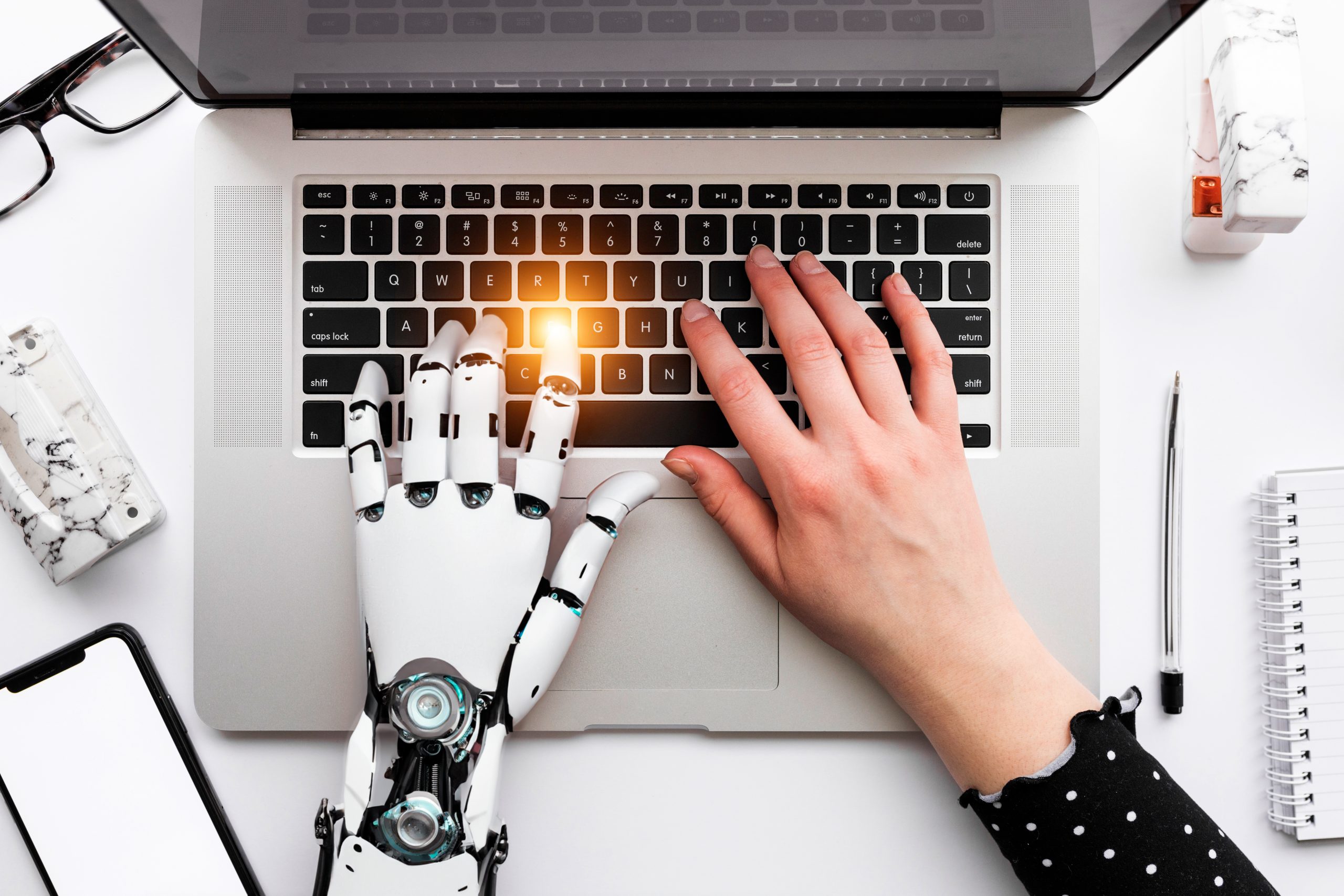
Ice-breakers
A handy and flexible tool to make your meetings more dynamic and engaging!

"It is not the strongest species that survives, nor the most intelligent, but the one that is most responsive to change." – Charles Darwin
Le leaders need to fear the rise of AI? Will it acquire the essential skills of good leaders to one day take their place and ironically relegate them to the rank of "lesserpuariens" in our organizations?
Forbes indicates that 81% of millennials fear that AI technology will fully or partially replace them.
Hollywood productions and science fiction books have contributed to fueling this wave of concern. The Matrix, West World, Blade Runner, 2001: A Space Odyssey by Arthur C. Clarke, and many other films and books have presented a dystopian vision of humanity's future. The abilities and skills of the heroic leaders we followed in these works seem unattainable, and our perception of AI is so influenced by them that we feel it's a competition between the machine and the hero-leader, where one will eventually replace the other.
La Harvard Business Review presents the controversy as follows: "The question of whether AI will replace human workers assumes that AI and humans have the same qualities and capabilities - but in reality, this is not the case. AI-based machines are fast, more accurate, and always rational, but they are not intuitive, emotional, or sensitive to culture. These are precisely the abilities that humans possess and which make us effective.".
Organizations have increasingly sophisticated digital tools that were unimaginable just a few years ago; clearly, AI is destroying jobs and creating others, just as has happened over thousands of years of human history, where almost every progress, feared at the beginning, eventually got tamed and adapted to real life.
Toutefois, les rôles qu’occupent les leaders dans nos organisations sont des plus sophistiqués, et les organisations elles-mêmes sont des organismes vivants et complexes régis par des valeurs qui dépassent les simples objectifs financiers.
With the analysis of facial micro-expressions, posture, spoken words, and written messages, AI will soon be able to detect signs of employee disengagement. However, it will not be able to master relational intelligence (active listening) and emotional intelligence (empathy) to respond to these signals. Leaders will need to continue developing these types of intelligence to complement AI. Indeed, the more sophisticated the tools, the more the soft skills required of a leader are essential, because it is their responsibility to implement them and optimize their use within the team, especially to manage resistance and concerns. AI does not possess subjectivity, does not feel emotions, does not put itself in someone else's shoes, and therefore cannot feel or use empathy (at least not yet). However, an employee who receives bad news, faces a difficult situation, or struggles with tasks, needs real empathy from their leader, not simulated empathy, and this skill becomes even more important in a world that is rapidly and increasingly complex.
Here is the translation: As cognitive intelligence is now mastered by AI, the leader will need to develop cognitive flexibility (his ability to adapt) in order to handle constantly evolving situations. He will need to develop advanced cognitive skills, such as ethical reflection, analyzing complex situations, openness to diversity, managing creative thinking, and developing collaborative strategies. While AI provides him with data and analysis in a fast and optimal way, he will have to decide how to handle them. When AI informs him with a graph that Fred is behind on his performance target, it is up to him to discuss the issue with Fred to find the root of the problem and address it. If AI signals a decrease in engagement within the team, it is up to him to understand the deep motivations and working styles of the team members and design improvement and resolution strategies with them. He must also develop the ability to critically assess the data provided by AI.
You must tame the beast before deploying it for use in your team. Understand how AI works and affects your business, how it can add value to your operations, by educating yourself about the topic in your industry and seeking advice and tips from experts.
It is true that it is problematic when an employee contests the adoption of AI; it's the same employee who refused to use the internet 25 years ago. However, the reluctance is understandable and must be acknowledged, and discussing it is the first step toward acceptance. The employee wants reassurance and also appreciates honesty.
In detail and with supporting examples, explain to the concerned employees the redistribution of tasks between them and the AI, and how this will affect their daily work, emphasizing the advantages that will allow them to become more efficient, free themselves from repetitive and time-consuming tasks, and focus on more intellectually stimulating projects that they say they never have time to tackle.
When implementing AI, ask for the opinions and concerns of your employees. An employee who is listened to will feel valued and respected, and will actively contribute to the success of the project.
There is no turning back, AI is here to stay, AND humans are here to control it. Train your collaborators technically because new skills need to be introduced, such as AI ethics, vigilance against cyberattacks, etc., and don't forget the emotional aspect; training on change management is very relevant in this context. If your employee manages to adopt an open attitude, they will feel in control of the situation and not the other way around. They will treat AI as a tool at their disposal and won't feel threatened by it.
AI is a machine that can operate 24/7 without sick leave, holidays, etc. It will provide you with information continuously. Not you.
AI is entering organizations, and leaders are learning to relinquish part of their power to an algorithm, delegating certain tasks to it that it can perform more efficiently.
Thanks to AI, leaders will be freed from time-consuming tasks (such as project planning and management, monitoring, applying standards and regulations, etc.). Their operations will be enhanced, and their decisions more informed because they will be assisted by a smart, high-performance tool (optimizing emails, data, and resources, scheduling appointments, personalizing presentations, etc.). This will allow them to focus more on human activities with their teams and on the development of creative and innovative strategies.
Une des multitudes questions qui se posent désormais est la suivante: If the strategic decision made one day by the leader, based on data analysis (whether from AI or not), their intuition, experience, and expertise, but also subject to cognitive biases, contradicts the decision made by the AI, which authority will prevail?

A handy and flexible tool to make your meetings more dynamic and engaging!

"Janine, we're equals here. I just have a different role and responsibilities than you. You don't respect me less or more by calling me by my first name. I want to earn respect from my colleagues."

Identify the practices you already master and those that need to be implemented

Deploying modern, effective, and deeply human leadership is not easy. It's demanding. Sometimes uncomfortable. But above all, it has become essential.
C’est exactement ce que

The art of asking questions is a leader-coach's primary tool, enabling him to stimulate learning, facilitate creativity, improve performance, mitigate risk and build confidence.

What happens when trust is weakened within a team? Jorj tells us about it in this video, in collaboration with the Ordre des CRHA.
We look forward to hearing from you to learn how we can support you.